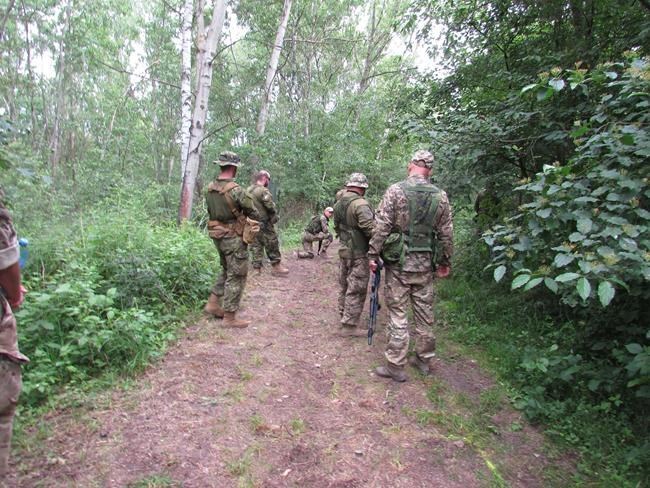WROCLAW, Poland — A passionate Ukrainian soldier hopes the skills he's learning from Canadian troops and their allies will ultimately help make a difference in winning the war with Russia.
About 100 Ukrainian soldiers are being trained at a secret location in southwestern Poland. Canadian military arranged for The Canadian Press to visit the camp.
The base is in a rural region with tiny villages, each blending into the next, with plenty of trees and privacy.
It's called Camp Sapper, named after elite combat engineers who are skilled in minefield placement and clearing, bridge building, demolitions, field defences, and road and airfield construction.
There are a variety of courses going on. One involves detecting mines first using a metal detector then lying prone and digging carefully into the dirt.
There are also impromptu exercises administering emergency first aid.
Every 15 minutes or so, there's a loud bang. A puff of smoke floats into the air as Polish soldiersprovide instructions.
"We can't organize such training in Ukraine because our position is always attacked by rockets and it's a big problem. But here we're feeling safe and can train, so it's amazing," says a 28-year-old Ukrainian engineer.
Wearing a balaclava, he introduces himself as Greek. He and the other soldiers can't be identified and have covered their faces.
"We need to demine territory for offence," he says. "As well, we need to demine de-occupied territory, because 80 per cent of victims from mines are civilian."
Greek is a drone operator. Like many Ukrainian soldiers, he expresses extreme pride in the efforts of his country.
He's heading into battle for the first time.
"I haven't been fighting yet, but I'm back to Ukraine at the end of June and I have a task already," he says.
"I'm going to the front line. I feel motivated and prepared."
Capt. Mark Schwarz, the Canadian troop commander of the engineer training element, says the work is rewarding, because the Ukrainian soldiers really want to learn.
"We train Ukrainian combat engineers in demolition and operations in counter explosive threat. It includes counter IEDs, counter booby traps and countering any other munitions that they find," he says.
"They're here for a reason. A lot of them are from the front lines. They know how valuable this engineering training is and we see it everyday in their enthusiasm."
Maj. Lukasz Lasota, a spokesman for the Polish armed forces, says the training would last three months in peacetime. But because of the urgency of the current war, it's compressed into 30 days.
"We need to squeeze this schedule and train them as quick as we can. We feel we're doing something that is important. It's not another exercise. It is real-life training," he says.
"They are motivated. And they feel that if they put attention here, they might use it there on the battlefield."
Many of the Ukrainian soldiers have picked up some English since arriving in Poland.
They are confined to the camp and tend to hang out in a large tent with furniture, TVs and video games. Called Ukrainian House, it's built with donations from Canada.
Lasota says he's proud to be part of the training.
"It will be the most rewarding if the war ends," he says.
"We look forward to see the final days of this war."
This report by The Canadian Press was first published June 20, 2023.
Bill Graveland, The Canadian Press




